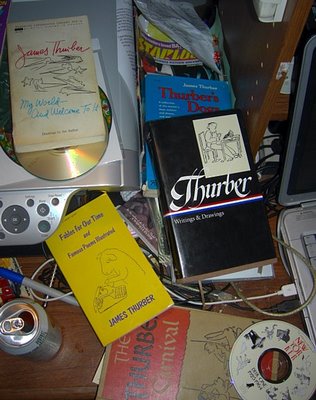
- It is better to ask some of the questions than to know all the answers.
- "The Scotty Who Knew Too Much", The New Yorker (18 February 1939)
It's 4 AM already, and my brain, back, and eyes decided an hour ago that they shouldn't be expected to do any more work tonight. So I'm aiming for a short entry tonight, passed out with the stuff I'm writing about: quotations by James Thurber.
- Don't get it right, just get it written.
- "The Sheep in Wolf's Clothing", The New Yorker (29 April 1939); Fables for Our Time & Famous Poems Illustrated (1940). The moral is ironic.
I spent six hours tonight tracking down 17 quotations by James Thurber. Perhaps if I explain, you'll be able to decide whether this is a new obsession, a minor variant on the existing one, or an evening's aberration. It started a day or two ago, when someone
added the following to the
Wikipedia article on James Thurber, right at the beginning of the bio after a discussion of Thurber's mother:
Some relatives still living today include Mark M... of M..., New Jersey and his family. [Identifying details removed at person's request, May 2008]I had a minor wrangle with someone over the fact that I took this out. Relative he might be, but Mr. M, whose sole claim to fame other than family connection is that he once sold a crossword puzzle for publication, is unlikely to be more notable that any other living Thurber relative. I pointed this out, and the person who griped at my edit added references to other Thurber relatives to balance things out. I'd not an ideal solution, but it will do for now.
- "All right, have it your way - you heard a seal bark!"
- "Women and Men", The New Yorker (30 January 1932);The Seal in the Bedroom and Other Predicaments (1932).
Anyway, today someone else made a minute edit, and it occurred to me that the bio section of the article wasn't very good and could use a rewrite. I pulled up the Thurber House page with the bio on it, and did a quick revision. Then I was going to go back and add citations, maybe even do a more thorough rewrite from other sources - but I never got there.
- A pinch of probability is worth a pound of perhaps.
- note for "a future fable", "Such a Phrase as Drifts Through Dreams", Holiday Magazine; reprinted in Lanterns & Lances (1961).
You see, there's a rather long list of quotations on the Thurber article, probably because he said quote a few interesting, funny, profound and/or memorable things, and people keep wanting to add their favorites. Like trivia, though, a long list of quotes is looked down upon at Wikipedia. I wondered, therefore, whether it might be worth moving some of them to Wikipedia's sister site on Wikimedia, Wikiquote. So I followed the
link to Wikiquote, to see what was there already.
- It is better to have loafed and lost, than never to have loafed at all.
- "The Courtship of Arthur and Al", The New Yorker (26 August 1939); Fables for Our Time & Famous Poems Illustrated (1940). Parody of Alfred Lord Tennyson, Better to have loved and lost/than never to have loved at all.
Well. There are, by actual count, nearly 100 Thurber quotes there, over half of which weren't nailed down as to where they came from. You probably know by now how the Internet is: the various quotation sites copy from each other, until everyone has the same long list of assorted quotes, half properly quoted and attributed, half not-so-much.
- In this light, let's not look back in anger, or forward in fear, but around in awareness.
- "Foreword", Lanterns & Lances (1961)
Six hours later, I had organized the Wikiquote page into more sections, pulled half my Thurber books off their shelf, run a search for Thurber on a CD of
New Yorker cartoons, tracked down the source for 17 quotes and entered them. While I was at it I was able to fix about five misquotes, read bits and pieces of a lot of diverse Thurber material,and generally had a great time.
- The dog has got more fun out of Man than Man has got out of the dog, for the clearly demonstrable reason that Man is the more laughable of the two animals.
- "An Introduction", The Fireside Book of Dog Stories (Simon and Schuster, 1943); reprinted in Thurber's Dogs (1955)
But now it's almost 5 AM, and I really, really, really need to go to bed. Good night!
Karen
Technorati Tags: Quotations, Thurber, Wikipedia

1 comment:
Do you remember a show on TV in the mid to late 1960's about Thurber? (you were a baby then, I know!) I loved that show and ended up reading quite a few Thurber books. I love the quote about loafing.
Sounds like you spent the day engrossed in a labor of love.
Post a Comment